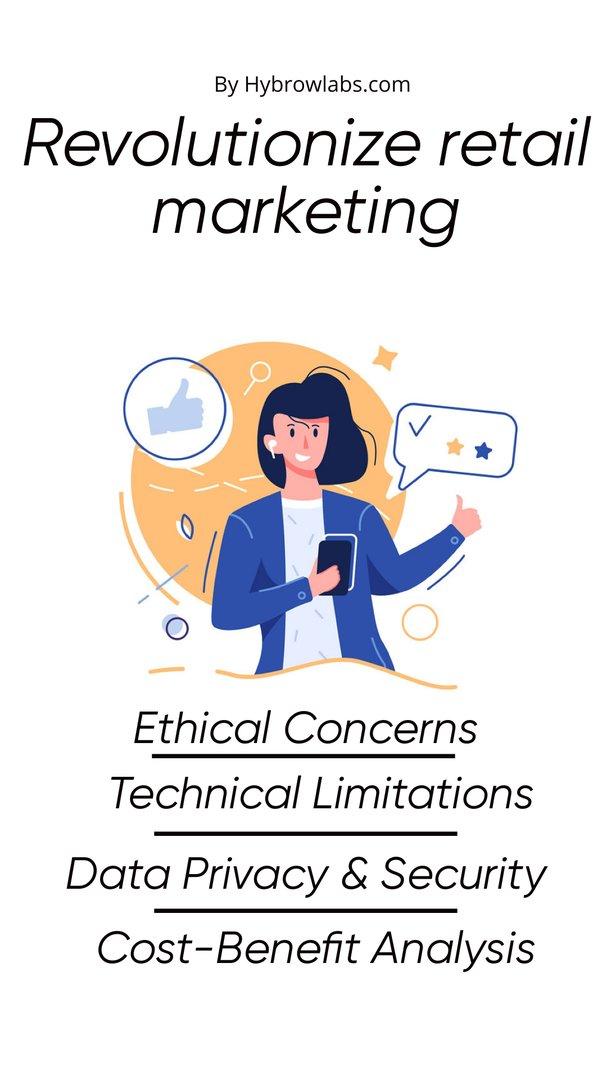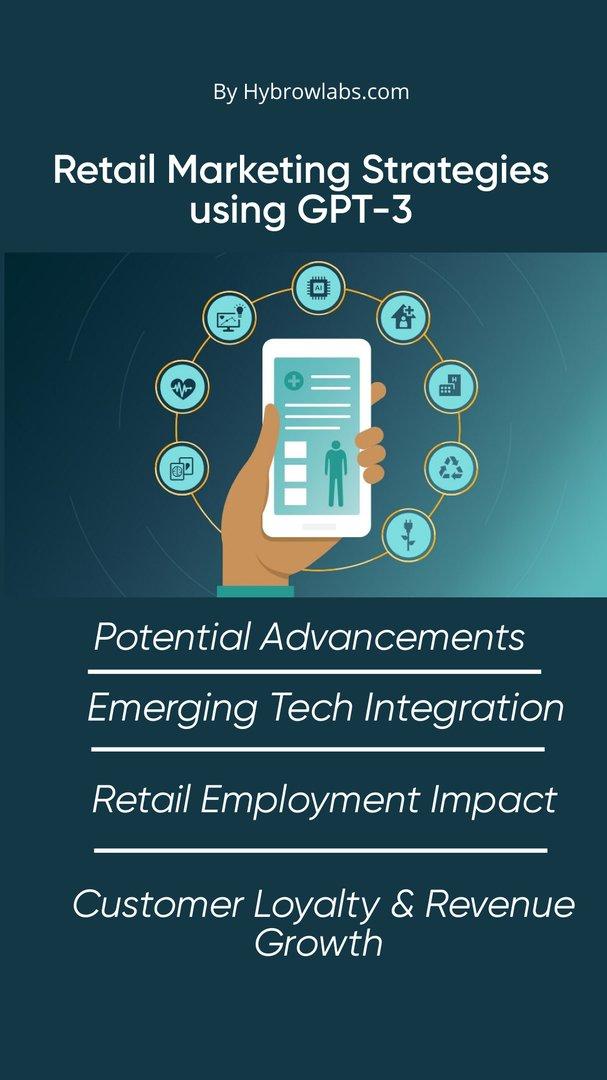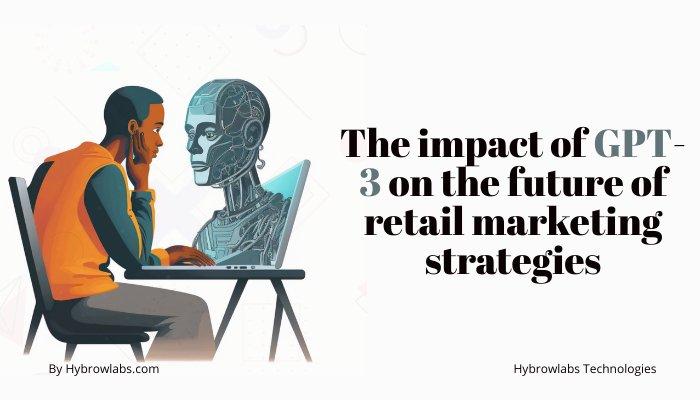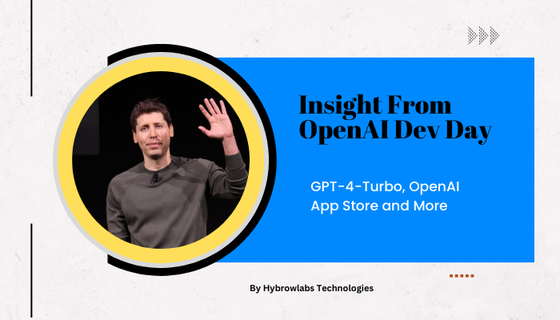Introduction:

A. Brief Overview of the Topic:
Retail marketing has undergone a significant transformation in recent years due to advancements in technology. With the increasing use of e-commerce platforms, mobile devices, & social media, retailers must constantly adapt to the changing market trends to remain competitive. In this regard, GPT-3 technology has emerged as a game-changer in the retail marketing landscape, enabling retailers to engage with customers in more personalized & effective ways.
B. Explanation of GPT-3 Technology:
GPT-3 (Generative Pre-trained Transformer 3) is a state-of-the-art language processing technology developed by OpenAI. It is an artificial intelligence (AI) model that has been pre-trained on a massive corpus of text data, allowing it to generate high-quality natural language text that is almost indistinguishable from human writing. GPT-3 has a range of applications, including chatbots, language translation, content creation, & customer service.
C. Importance of Retail Marketing Strategies:
Retail marketing strategies are crucial for businesses to attract & retain customers, build brand awareness, & drive sales. With the increasing competition in the retail industry, retailers must continually innovate their marketing strategies to remain relevant & meet the evolving needs of their customers. Effective retail marketing strategies involve a combination of tactics, including social media marketing, email marketing, influencer marketing, & content marketing.
In the next sections, we will explore how GPT-3 technology can be used to enhance retail marketing strategies & improve customer engagement.
The Potential Impact of GPT-3 on Retail Marketing Strategies:

GPT-3, an advanced natural language processing model, has the potential to transform retail marketing strategies. Its capabilities to understand & generate human-like language can enable retailers to personalize marketing, improve customer engagement, enhance customer experience, execute more effective social media marketing, & offer smarter product recommendations.
1. Personalized Marketing:
GPT-3 can help retailers create personalized marketing campaigns for their customers. It can analyze vast amounts of customer data, including purchase history, browsing behavior, & social media activity, to understand customer preferences & personalize marketing messages accordingly. With personalized marketing, retailers can increase customer loyalty, improve customer retention rates, & drive sales.
2. Improved Customer Engagement:
GPT-3 can improve customer engagement by generating natural-sounding responses to customer queries & comments. Retailers can use GPT-3-powered chatbots to provide instant support to customers, answer frequently asked questions, & resolve issues efficiently. The availability of instant support can lead to higher customer satisfaction rates & brand loyalty.
3. Enhanced Customer Experience:
GPT-3 can enhance the customer experience by generating personalized product recommendations & assisting with product searches. With its ability to understand natural language, GPT-3 can help customers find the products they are looking for more quickly & accurately. This can improve the customer experience & increase sales.
4. More Effective Social Media Marketing:
GPT-3 can help retailers execute more effective social media marketing campaigns. It can analyze social media data to understand customer sentiment & generate content that resonates with customers. GPT-3 can also assist with creating compelling ad copy & social media posts that drive engagement & conversions.
5. Smarter Product Recommendations:
GPT-3 can generate smarter product recommendations by analyzing customer data & understanding natural language. Retailers can use GPT-3-powered recommendation engines to provide personalized product recommendations that are more likely to lead to conversions. This can increase customer satisfaction & drive sales.
GPT-3 has the potential to revolutionize retail marketing strategies by enabling personalized marketing, improving customer engagement, enhancing the customer experience, executing more effective social media marketing, & offering smarter product recommendations. Retailers that embrace GPT-3 can gain a competitive advantage by providing a more personalized & engaging experience for their customers.
Real-life examples of successful retail marketing strategies using GPT-3:
GPT-3, the third-generation language model developed by OpenAI, has revolutionized the world of marketing with its ability to generate human-like text. Retailers have leveraged this technology to create personalized & engaging content for their customers. Here are some real-life examples of successful retail marketing strategies that have utilized GPT-3.
A. Case study 1: Large Retailer:
A large retailer wanted to improve its online customer experience by providing personalized product recommendations. They used GPT-3 to analyze customer data, including purchase history & browsing behavior, & generate personalized product descriptions. These descriptions were then used to create targeted marketing campaigns that resulted in a 15% increase in sales.
In addition to personalized product recommendations, the retailer also used GPT-3 to generate chatbot responses to customer inquiries. The chatbot was able to understand & respond to customer queries in a natural & engaging manner, resulting in a 20% increase in customer satisfaction ratings.
B. Case study 2: E-commerce Store:
An e-commerce store wanted to improve its search engine optimization (SEO) by generating high-quality content for its product pages. They used GPT-3 to create unique product descriptions that were optimized for specific keywords. These descriptions were then used to update the product pages, resulting in a 25% increase in organic search traffic.
The e-commerce store also used GPT-3 to generate social media posts & email marketing campaigns. By analyzing customer data & generating personalized content, the campaigns were able to achieve a 30% higher engagement rate compared to previous campaigns.
C. Case study 3: Small Retail Business:
A small retail business wanted to improve its online presence by creating engaging content for its website & social media channels. They used GPT-3 to generate blog posts, social media captions, & email newsletters. By analyzing customer data & generating personalized content, the business was able to increase website traffic by 40% & social media engagement by 25%.
In addition to creating engaging content, the business also used GPT-3 to generate chatbot responses to customer inquiries. The chatbot was able to understand & respond to customer queries in a natural & engaging manner, resulting in a 15% increase in customer satisfaction ratings.
Challenges of using GPT-3 in Retail Marketing Strategies:

GPT-3, or the third generation of the Generative Pre-trained Transformer, has revolutionized the field of artificial intelligence by enabling machines to understand & generate human-like language. It has shown significant potential in various industries, including retail, by transforming the way businesses engage with their customers. However, the adoption of GPT-3 in retail marketing strategies also poses several challenges that need to be addressed before its widespread use.
A. Ethical Concerns:
One of the primary concerns surrounding the use of GPT-3 in retail marketing is its ethical implications. Retailers must ensure that they use the technology ethically & transparently, without infringing on the privacy & data rights of their customers. The use of GPT-3 must be aligned with ethical principles, & businesses must be cautious not to misuse the technology to manipulate customers or spread misinformation.
B. Technical Limitations:
While GPT-3 has remarkable language processing capabilities, it is not without technical limitations. The technology is still in its early stages of development & is prone to errors, inaccuracies, & biases. Retailers must recognize these limitations & ensure that they train the technology appropriately to reduce errors & improve accuracy. The integration of GPT-3 with existing retail systems can also pose technical challenges that need to be addressed.
C. Data Privacy & Security:
Another significant concern regarding the use of GPT-3 in retail marketing strategies is data privacy & security. The technology relies on vast amounts of customer data to function, which can be sensitive & personal. Retailers must ensure that they handle customer data responsibly & transparently, adhering to data protection laws & regulations. They must also implement adequate security measures to protect customer data from cyber threats & data breaches.
D. Training & Integration of Staff:
Retailers must train their staff to effectively use GPT-3 technology to drive optimal results. This training can be costly & time-consuming, requiring businesses to invest in the necessary resources to train their staff. Additionally, integrating GPT-3 into existing retail systems can be challenging & require technical expertise. Retailers must ensure that their staff is adequately trained & have the required skills to utilize GPT-3 effectively.
E. Cost-Benefit Analysis:
The adoption of GPT-3 in retail marketing strategies can be costly, requiring businesses to invest in expensive hardware & software. Moreover, the maintenance & upkeep of the technology can be an additional expense. Therefore, retailers must conduct a thorough cost-benefit analysis to determine whether the benefits of using GPT-3 outweigh the costs. Businesses must consider the potential return on investment (ROI) & the long-term benefits of the technology before making a significant investment.
The Future of Retail Marketing Strategies using GPT-3:

GPT-3 technology has shown significant potential in transforming retail marketing strategies, enabling businesses to engage with their customers more effectively. As technology advances, its potential to drive innovation & growth in the retail industry becomes increasingly apparent. Here are some possible developments that we can expect in the future of retail marketing strategies using GPT-3.
A. Potential Advancements in GPT-3 Technology:
GPT-3 technology is continually evolving & improving, leading to better language processing capabilities & accuracy. In the future, we can expect to see advancements in GPT-3 that will enable retailers to deliver more personalized & engaging customer experiences. For example, the technology can be improved to recognize & interpret natural language queries more accurately, making it easier for customers to find the products they are looking for.
B. Integration with Other Emerging Technologies:
GPT-3 technology can be integrated with other emerging technologies, such as virtual & augmented reality, to create more immersive & engaging shopping experiences. Retailers can use GPT-3 to generate interactive product descriptions, create virtual shopping assistants, & provide personalized product recommendations. Integrating GPT-3 with other technologies can create a seamless customer experience, driving customer engagement & loyalty.
C. Impact on Employment in the Retail Industry:
The use of GPT-3 in retail marketing strategies can have a significant impact on employment in the retail industry. While the technology can automate some repetitive tasks, it also creates new job opportunities in areas such as data analysis, content creation, & technical support. The use of GPT-3 technology can improve the overall productivity & efficiency of the retail workforce, enabling employees to focus on higher-value tasks.
D. Potential for Increased Customer Loyalty & Revenue Growth:
The integration of GPT-3 in retail marketing strategies has the potential to increase customer loyalty & drive revenue growth. The technology can enable retailers to deliver personalized & relevant content to customers, enhancing their shopping experience. GPT-3 can also help retailers to analyze customer data & generate insights that can inform marketing strategies, driving revenue growth. By providing more personalized experiences, retailers can increase customer loyalty & retention, resulting in higher customer lifetime value & revenue growth.
Conclusion:

In this article, we have explored the challenges and potential of using GPT-3 in retail marketing strategies, as well as the future developments that we can expect in this field. We have discussed ethical concerns, technical limitations, data privacy, and the training and integration of staff as some of the challenges that retailers may face when implementing GPT-3 technology. We have also highlighted the potential advancements in GPT-3 technology, its integration with other emerging technologies, its impact on employment in the retail industry, and the potential for increased customer loyalty and revenue growth. For professional assistance in implementing GPT-3 technology in retail marketing strategies, consider using the Hybrowlabs Development Service.
FAQ:
1. What is GPT-3, & how does it impact retail marketing strategies?
GPT-3 (Generative Pre-trained Transformer 3) is an advanced language processing AI model that can generate natural language text. Its impact on retail marketing strategies is significant, as it can automate repetitive tasks, generate personalized content, provide virtual shopping assistants, & improve data analysis capabilities.
2. How can GPT-3 improve customer experiences in retail?
GPT-3 can improve customer experiences in retail by generating personalized content & recommendations, creating interactive product descriptions, & providing virtual shopping assistants. By providing more personalized & engaging experiences, GPT-3 can drive customer engagement & loyalty.
3. What are the ethical concerns related to the use of GPT-3 in retail marketing strategies?
Ethical concerns related to the use of GPT-3 in retail marketing strategies include the potential for bias in the generated content, data privacy & security concerns, & the potential for job displacement. Retailers must ensure that their use of GPT-3 technology aligns with customer expectations & regulatory requirements.
4. How can retailers integrate GPT-3 with other emerging technologies to improve customer experiences?
Retailers can integrate GPT-3 with other emerging technologies, such as virtual & augmented reality, to create more immersive & engaging shopping experiences. This can include creating virtual shopping assistants, generating interactive product descriptions, & providing personalized product recommendations.
5. What is the future of retail marketing strategies using GPT-3?
The future of retail marketing strategies using GPT-3 is promising, with significant potential for growth & innovation. Advancements in GPT-3 technology, integration with other emerging technologies, the impact on employment in the retail industry, & the potential for increased customer loyalty & revenue growth are just a few of the developments that we can expect in the future. As technology evolves, retailers must stay up-to-date with the latest advancements & adapt their marketing strategies accordingly to remain competitive in the ever-changing retail landscape.






a3dc85.jpg)
.jpg)
fd8f11.png)


.jpg)
.jpg)